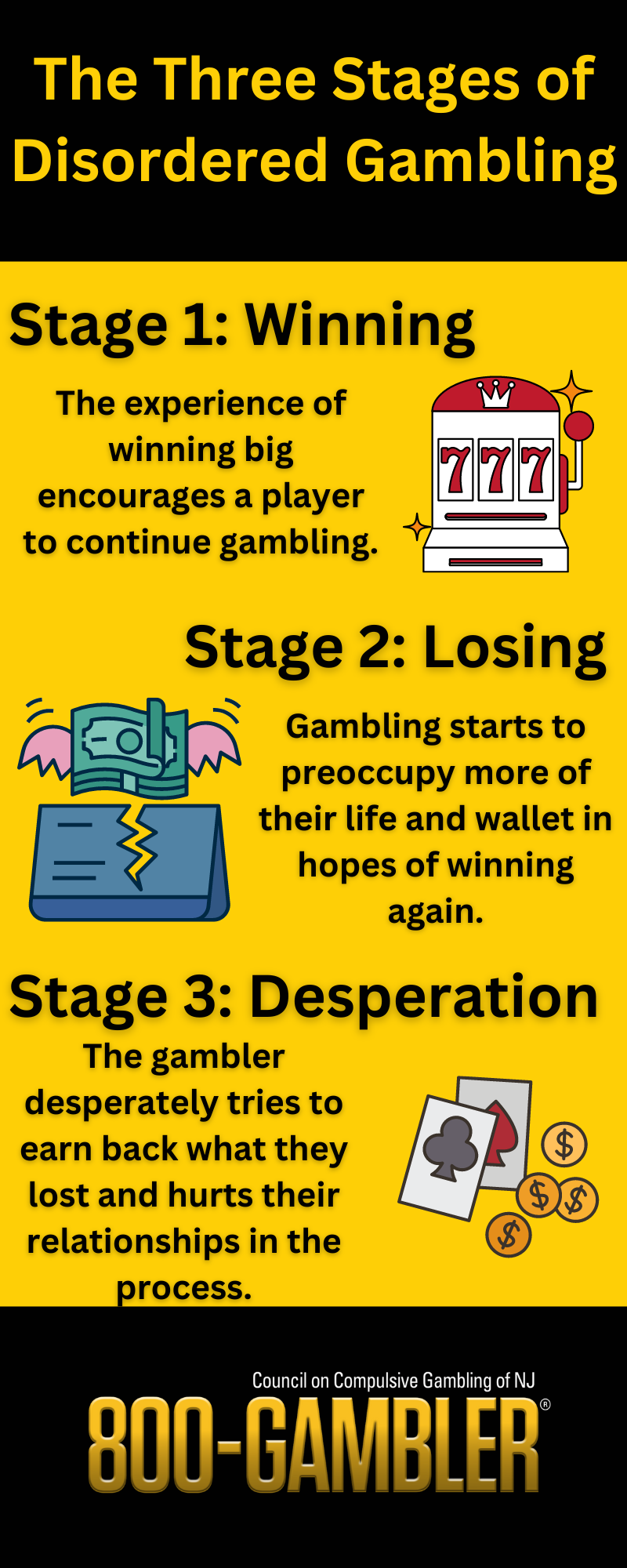Historically, the medical community has only recently recognized disordered gambling as a condition on par with other behavioral disorders, like substance use disorders. In the past, even the most enlightened medical professionals might have seen an individual’s inability to stop betting on sports in Atlantic City as a “failure of character.” Now, thanks to the efforts of pioneers like Dr. Robert Custer, we know that disordered gambling actually develops due to changes in brain chemistry over time. Today, therapists still refer to Dr. Custer’s model for how a gambling disorder develops. In his studies, Dr. Custer identified winning, losing, and desperation as the three major phases of disordered gambling.
On the surface, these three stages do not sound very complicated to understand — but there is much more to each of them than you may realize. Each phase contributes to disordered gambling problems in its own way, and it’s important to recognize each to identify if you or a loved one is struggling with a gambling issue. To learn more about the stages of disordered gambling, here’s a look at each phase, how to identify them, and what they mean in the overall scope of problem gambling.

Phase 1: Winning
The first phase of disordered gambling is the winning stage, where individuals become hooked on the prospect of winning big and perceive gambling as exciting and positive. At the most basic level, people develop gambling disorders due to how the brain’s chemical dopamine affects behavior. Dopamine causes that rush of happiness or excitement that one feels after winning a bet or wager.
After a gambler first experiences the rush of a big win or a series of semi-regular wins, they can get used to the feeling of success and want more. If they continue to pursue the sensation — perhaps as a distraction from emotional pain elsewhere in their life — they may become desensitized to the dopamine the brain releases. To keep feeling the thrill of winning, they might place larger and riskier bets to make bigger profits. A person in the first stage of disordered gambling may try to justify taking cash from their savings account and borrowing money as a long-term investment.
Unfortunately, this practice ultimately proves unsustainable and only worsens the stress and anxiety they experience when they inevitably lose. Due to the fleeting nature of luck and their illusion of control, this is a relatively short stage of disordered gambling.
Phase 2: Losing
Following the winning phase is the stage of disordered gambling that’s unavoidable — the losing stage. During this phase, they become more focused on gambling than ever before. Paradoxically, as a disordered gambler’s wins become less and less impactful to their emotional state, they become increasingly obsessed with the pastime. Wins hardly register — they’re already thinking of the next bet. More and more of their funds go to gambling. They soon develop serious financial issues. When they lose, they “chase the loss,” immediately trying to win back what they lost, perpetuating a self-destructive cycle.
Even before this stage of disordered gambling begins, an individual may already be facing financial problems due to their constant spending. As a result, they may have difficulties paying for essential payments like bills and fail to pay back their bills on time. When their family members and friends ask them what happened to all of their money or where they’re spending so much time, they’ll start to cover up their problem gambling behaviors with lies.
After experiencing the highs of winning, it will still be hard for someone in the losing phase to stop gambling, even after a long losing streak. Their small gambling victories every now and then can keep their illusion of success alive and offer them a glimmer of hope that their winning streak will resume — even after sustaining significant losses.
Phase 3: Desperation
The lack of control over their behavior leads to an individual’s desperate attempts to offset their surmounting financial losses — this is known as the desperation stage of disordered gambling. Rather than let go of their gambling and recover their money naturally, they instead dive deeper into their attempt to restore all that they lost. To a person in this phase of disordered gambling, the only way out of their problem is by participating in it, even more, creating a destructive, cyclical effect.
After a disordered gambler develops financial problems but still cannot stop gambling, they often feel deep remorse, shame, and guilt for their actions. Unfortunately, this may cause them to alienate friends and family and try to hide their behavior. Worse, they may lead them to argue with loved ones, shift the blame to others, and cause a multitude of relationship problems. They may turn to substance abuse to distract themselves from their emotional pain.
During this phase, problem gamblers may steal or commit fraud to continue funding their gambling. If left untreated, gamblers in the desperation phase may take drastic actions, leading to their arrest or even suicide. Due to the seriousness of this stage of disordered gambling, it is essential for individuals to seek appropriate mental health support.
We Can Help You Throughout the Stages of Disordered Gambling
No matter how far an individual’s gambling disorder has progressed, treatment and support can still help them recover. At 800-GAMBLER, we offer hope for anyone that resolves to change their behavior. We have a variety of tools to help you overcome problematic behavior, including videos on gambling and gamblers’ anonymous resources. If you or a loved one need help with unhealthy sports gambling in East Rutherford, NJ, or any other gambling activity, call our free, confidential hotline, 1-800-GAMBLER.



